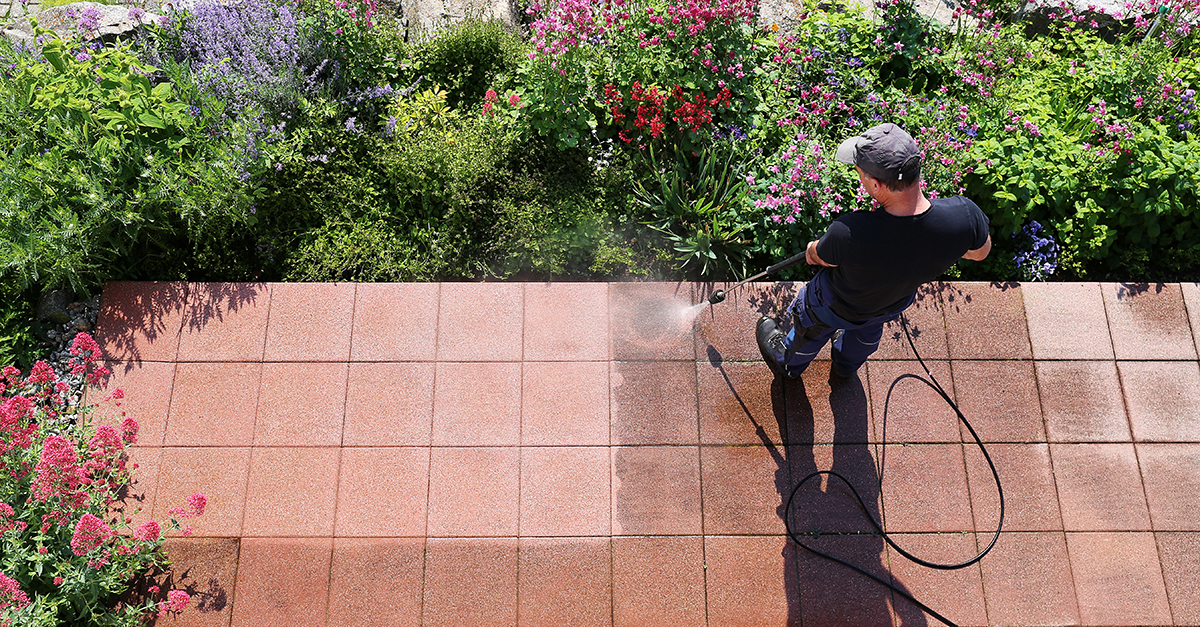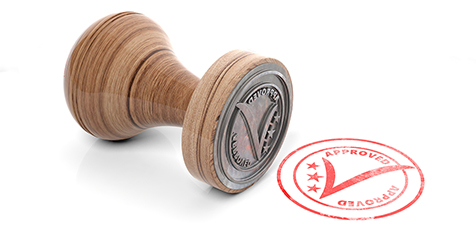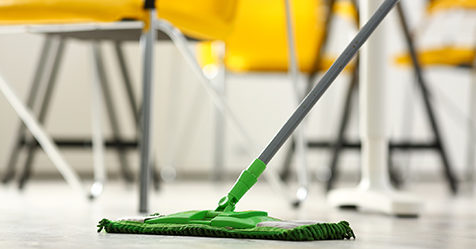Is the outside of your facility looking a bit dingy from the effects of winter weather? A pressure washing to flush out soils quickly and efficiently might be just what your facility’s exterior surfaces need this spring.
Pressure washing can replace the need to manually scrub surfaces with a brush and detergent. “Speed is a main advantage of pressure washing,” said Nate Abrahams, senior sales trainer at Kärcher. “That equates to money, because if you’re hiring someone to clean, it could take them a day to complete the job rather than a week.”
Pressure washing your facility’s exterior surfaces will not only benefit its curb appeal. It will also help keep the interior cleaner. “Most of the soil in your buildings is from walk-in foot traffic,” Abrahams said. “If you can remove dirt, oils, and spills on sidewalks, drive-up areas, entryways, and other waiting areas, you lower the amount of dirt brought inside.”
Despite the advantages of pressure washers, facility managers might be hesitant to implement this equipment into their facility’s exterior cleaning routine because they fear damaging surfaces or injuring their staff. However, using the correct accessories and personal protective equipment (PPE), along with following best practices, will prevent facility damage and keep cleaning staff safe.
Consider your spray pressure
Using the correct nozzle is key to avoiding damage. “The nozzle creates the pressure at different spray angles: 15 degrees, 25 degrees, and 40 degrees,” Abraham said, comparing the spray angles to a V shape, with the 15-degree angle delivering the most concentrated spray. “You need the right nozzle and the right distance. If you’re pressure washing a painted wooden fence you might take the paint off if you’re standing too close and using a 15-degree spray.”
Abrahams recommends spraying 4 to 12 inches away from the surface you’re cleaning for optimal results. He added that the sound of the water against the surface will be at its the loudest when the user is spraying at the most effective distance.
Electric vs. gas, hot water vs. cold
When purchasing a pressure washer, the first decision you’ll need to make is between an electric or gas machine. Abrahams said electric models typically cost less, don’t need regular tune-ups like a gas engine would, and are quieter to operate.
“They are good for hotels and other areas where you want less noise,” he said. “They are lightweight and easy to move, and if you have multiple places to plug them in, you are good to go.”
However, the cord can result in portability issues, and some models might require 230 volts. Gas pressure washers can be higher-performance machines, available in units up to 13 horsepower compared to two horsepower, which is typical for electric units, Abrahams said. With all this power, they clean much quicker than electric machines.
On the downside, gas pressure washers are noisy and require regular maintenance. “Like our cars, they need tune-ups, spark plug changes, and new filters,” Abrahams said. “You need gas on hand to refill them.”
Pressure washers are also available in hot-water and cold-water models. Abrahams said the hot-water models clean surfaces 40% to 60% quicker than cold. They are also more efficient in removing oils, grease, and other stains. “Cold-water machines just push grease around; they don’t really remove it without detergent,” Abrahams said.
Cold-water pressure washers, which cost less and require less maintenance than hot-water models, are most effective against dirt, dust, and sand. “These are soils that just need water and pressure to dislodge them,” Abrahams said.
Choose your accessories
A common mistake Abrahams sees in relation to pressure washers is operators neglecting to use the proper accessory. “I see people using a wand to wash sidewalks, walking along, swiping the wand back and forth. But when we swipe the wand back and forth, we are changing the spray distance,” he said, explaining that the result is a streaked surface.
Instead, Abrahams recommends using a surface cleaner, which attaches to the pressure washer hose and spins two inches above the surface. This accessory evenly sprays water over the surface, ensuring a uniformly clean sidewalk.
Abrahams has also seen pressure washer users trying to clean high surfaces with a standard wand instead of a telescoping wand. “A regular wand can spray maybe 6 feet up, but it’s mostly mist at that point,” he said. “However, you can spray up to 25 feet up with a telescoping wand.”
Abrahams recommends determining what surfaces you want to clean with a pressure washer, then determining which attachment will achieve your desired results. “There are different nozzles you can purchase, detergent ejectors, you name it,” he said. “These accessories give your pressure washer more flexibility. Maybe you originally bought the washer for cleaning a hotel pool deck, but down the road, you want to use it to clean second-floor balconies. Your pressure washer becomes more adaptable with the correct add-ons.”
Don’t forget about safety and longevity
Although using a pressure washer might seem intuitive, reading the instruction manual is a crucial first step before operation.
Next, gather the proper PPE, such as safety glasses. “If you’re spraying in a corner, gravel could bounce back at you, or you could get detergent in your eyes,” Abrahams explained.
As a pressure washer’s thin, forceful stream has been found to cut through leather boots, consider protecting other parts of your body as well. “Steel-toe boots are never a bad idea, along with gloves and maybe a rain jacket, depending on the soil you are removing,” Abrahams said. Avoid using a wand that is shorter than 36 inches to keep the spray away from your face when you are holding it. And don’t swipe the wand past your hand.
Make sure you buy a machine that has a ground fault circuit interrupter (GFCI) and meets the Underwriters Laboratories (UL) 1776 standard, which applies to cleaning equipment with a fluid pressure greater than 100 pound-force per square inch (psi) but no greater than 5,000 psi. “UL 1776 is a voluntary certification, so if you’re not careful you could buy one that does not meet the standard,” Abrahams said.
He also encouraged facility managers to buy a commercial pressure washer that will stand up to the rigors of frequently cleaning a public building. “Do your research. Sometimes people will buy a pressure washer at a big box store that is a residential machine, not a commercial machine. It is a lower performance machine that will not last as long,” Abrahams said. He explained that a residential machine can handle about half an hour of use once a month, but using it two hours every week would wear it out quickly. “These people will end up buying two or three residential cold-water machines a year. Although a commercial unit is more expensive, you will save a lot of money because it can last for 10 years if you take care of it.”




